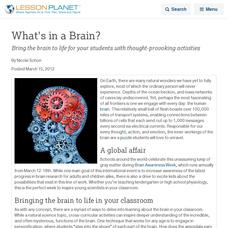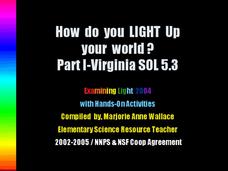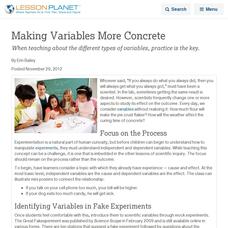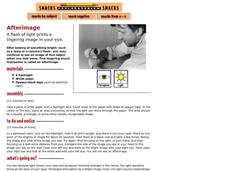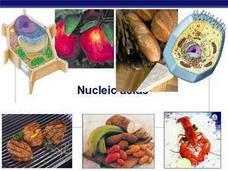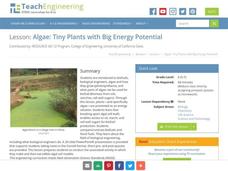Curated OER
Pump It Up!
Young scholars design a pumping device that will effectively pump fluid through a model "cardiovascular system." They explore the effects of too much and too little pressure on a circulatory system.
Curated OER
How Do Antiretroviral Drugs Work?
In this biology learning exercise, students watch a series of videos and complete 10 short answer questions right after. They explain how ART drugs interrupt the life cycle of HIV.
Curated OER
Get Crafty! Integrate Art and Science
By combining diverse subjects, you will create some of your most memorable lessons.
Serendip
Is Yeast Alive?
Through two investigations, life science learners determine whether or not yeast is alive. They perform tests for metabolism by providing sugar and observing if gas is produced as a byproduct. They incubate some of the sample for at...
Curated OER
Pregnancy
Dispel the many myths and misunderstandings for teens regarding pregnancy. Health students discuss the reproductive system, how conception occurs, and review new information through an excellent in-class game. Some wonderful blackline...
Curated OER
Enzymes Help Us Digest Food ~ Introduction to Sugars and Enzymes
After an explanatory introduction to sugars and enzyme activity, biochemists discover whether lactase is needed to digest lactose, sucrose, and milk as a whole. High school science lab skills are required for these investigations.
Curated OER
What's in a Brain?
Bring the brain to life for your students with thought-provoking activities
Curated OER
How Do You Light Up Your World?
A fabulous presentation on light is here for you. In it, learners view slides which cover many important concepts of light. They understand exactly what light is, what the main sources of light are, what opaque, transparent, and...
Curated OER
How Do You Light Up Your World?
A tremendous presentation on the properties of light. Young scientists are treated to slides which share a lot of fascinating information about light. This impressive PowerPoint is filled with great photos, graphics, and discussion...
Curated OER
Making Variables More Concrete
When teaching about the different types of variables, practice is the key.
Exploratorium
Afterimage
To illuminate how afterimage occurs, create a star, square, or other geometric-shaped light for learners to look at for 30 seconds. Then, have them explain what they see as they shift their focus to a blank wall. A full explanation of...
NASA
The Electromagnetic Spectrum
Did you realize the visible light spectrum is less than three percent of the electromagnetic spectrum? A hands-onlesson includes five activities and experiments for scholars to explore and discover many advanced science concepts. They...
Consortium for Ocean Science Exploration and Engagement (COSEE)
Arctic Smorgasbord
Though the walrus spends roughly one third of its time on land, it eats organisms that live on the bottom of the ocean. The first in a series of five, the lesson plan uses a variety of plant and animal cards to have scholars build an...
University of Minnesota
Mirroring Emotions
Do you ever give your class the "teacher look"? Without saying a word, they become silent and engaged (hopefully). How do they know what you're thinking? Explore the concept of nonverbal communication and how it relates to our mirror...
Curated OER
The Brain’s Inner Workings
Do you want to learn about how you learn? Help pupils become the best learners they can be by teaching them how their brain works. The resources available include videos about brain structure and a study guide full of activities that...
K12 Reader
Excretory System
The subject of this life science reading comprehension learning exercise is the excretory system. After examining the provided article, readers respond to a series of questions using evidence found in the text.
Curated OER
Meiosis Worksheet
These two pages cover the gamut of topics regarding reproduction and DNA replication. Structures, processes, functions, and reasons for them are tested here. The questions are mostly multiple choice, but there are also a few...
Curated OER
Circulatory System
The ciculatory system is introduced here by means of clear, labelled diagrams and charts with details. After learning the basics of the heart strucure, a sequence of slides help show the flow the blood as the heart muscle contracts. A...
University of Minnesota
Sheep Brain Dissection
Bored with frog and earthworm dissections? Had your fill of fetal pigs? Anatomy students will be intrigued by the sheep's brain, and you will be prepared with guiding questions, extension activities, and pictures as they dissect one —...
Colorado State University
Can Energy Be Created or Destroyed?
Energy doesn't come out of nowhere! An engaging lesson has learners investigate energy as it transforms from one type to another. They collect data to prove that energy is not lost as it changes.
Curated OER
Nucleic Acids: information storage
This sequence of slides covers each main macromolecule that is involved with human structure and function. The history of nucleotide research and the way that they are formed is summarized, a diagram accompanies the explanation. The main...
Casimir Middle School
Biological Classification Worksheet
Classify living things with a set of worksheets that has pupils sorting and indentifying living and non-living things. Learners use the worksheets as a basis for finding their answers.
Teach Engineering
Algae: Tiny Plants with Big Energy Potential
My, what big energy potential you have! Scholars learn about the energy potential of using algae as a biofuel. A PowerPoint presentation first describes the structure of algae and then how researchers use algae as biofuel to produce energy.
Howard Hughes Medical Institute
Central Dogma and Genetic Medicine
Scientists work every day to find solutions to genetic diseases. Scholars learn about the process of gene sequencing, mutations, and the results. They explore genetic diseases and therapies to intervene and help and, through case...
Other popular searches
- Animal Cell Parts
- Eukaryotic Cells Parts
- Parts of Cell Wall
- Animal Cell Parts Pictures
- Cell Function and Parts
- Animal Cell Parts Draw
- Label Animal Cell Parts
- Cell Types and Parts
- Label the Parts of a Cell
- Cells Parts
- Parts of Cello
- Eukaryote Cells Parts








